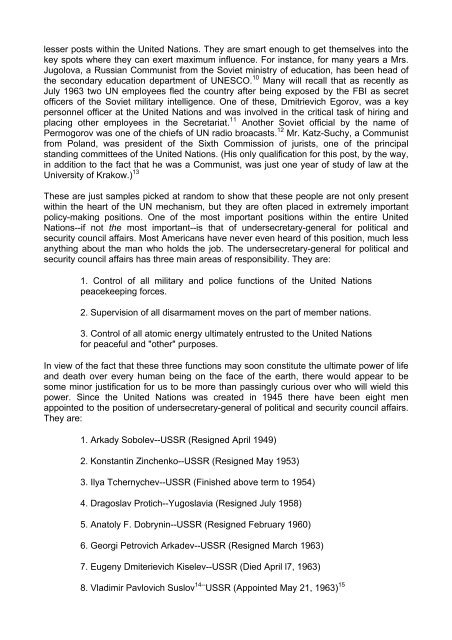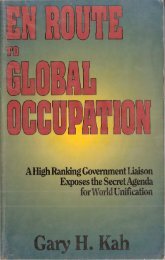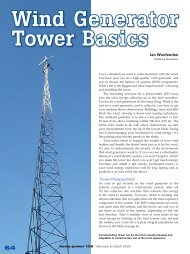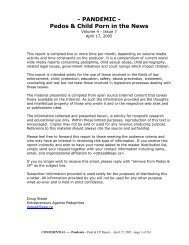G. Edward Griffin - The Fearful Master - PDF Archive
G. Edward Griffin - The Fearful Master - PDF Archive
G. Edward Griffin - The Fearful Master - PDF Archive
Create successful ePaper yourself
Turn your PDF publications into a flip-book with our unique Google optimized e-Paper software.
lesser posts within the United Nations. <strong>The</strong>y are smart enough to get themselves into the<br />
key spots where they can exert maximum influence. For instance, for many years a Mrs.<br />
Jugolova, a Russian Communist from the Soviet ministry of education, has been head of<br />
the secondary education department of UNESCO. 10 Many will recall that as recently as<br />
July 1963 two UN employees fled the country after being exposed by the FBI as secret<br />
officers of the Soviet military intelligence. One of these, Dmitrievich Egorov, was a key<br />
personnel officer at the United Nations and was involved in the critical task of hiring and<br />
placing other employees in the Secretariat. 11 Another Soviet official by the name of<br />
Permogorov was one of the chiefs of UN radio broacasts. 12 Mr. Katz-Suchy, a Communist<br />
from Poland, was president of the Sixth Commission of jurists, one of the principal<br />
standing committees of the United Nations. (His only qualification for this post, by the way,<br />
in addition to the fact that he was a Communist, was just one year of study of law at the<br />
University of Krakow.) 13<br />
<strong>The</strong>se are just samples picked at random to show that these people are not only present<br />
within the heart of the UN mechanism, but they are often placed in extremely important<br />
policy-making positions. One of the most important positions within the entire United<br />
Nations--if not the most important--is that of undersecretary-general for political and<br />
security council affairs. Most Americans have never even heard of this position, much less<br />
anything about the man who holds the job. <strong>The</strong> undersecretary-general for political and<br />
security council affairs has three main areas of responsibility. <strong>The</strong>y are:<br />
1. Control of all military and police functions of the United Nations<br />
peacekeeping forces.<br />
2. Supervision of all disarmament moves on the part of member nations.<br />
3. Control of all atomic energy ultimately entrusted to the United Nations<br />
for peaceful and "other" purposes.<br />
In view of the fact that these three functions may soon constitute the ultimate power of life<br />
and death over every human being on the face of the earth, there would appear to be<br />
some minor justification for us to be more than passingly curious over who will wield this<br />
power. Since the United Nations was created in 1945 there have been eight men<br />
appointed to the position of undersecretary-general of political and security council affairs.<br />
<strong>The</strong>y are:<br />
1. Arkady Sobolev--USSR (Resigned April 1949)<br />
2. Konstantin Zinchenko--USSR (Resigned May 1953)<br />
3. Ilya Tchernychev--USSR (Finished above term to 1954)<br />
4. Dragoslav Protich--Yugoslavia (Resigned July 1958)<br />
5. Anatoly F. Dobrynin--USSR (Resigned February 1960)<br />
6. Georgi Petrovich Arkadev--USSR (Resigned March 1963)<br />
7. Eugeny Dmiterievich Kiselev--USSR (Died April l7, 1963)<br />
8. Vladimir Pavlovich Suslov 14-- USSR (Appointed May 21, 1963) 15



![Robert T McQuaid [rtmq@stn.net] Sent: Friday, October 29, 2004 12 ...](https://img.yumpu.com/51070071/1/190x245/robert-t-mcquaid-rtmqstnnet-sent-friday-october-29-2004-12-.jpg?quality=85)







